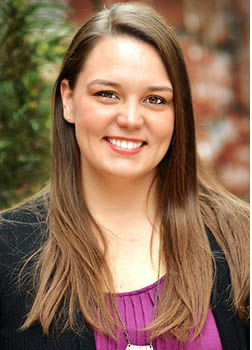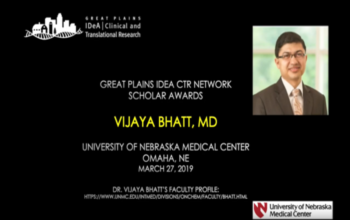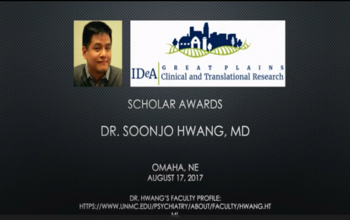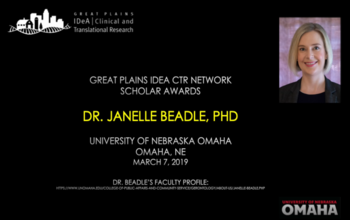
Graduate Scholar Series: Elizabeth Heinrichs-Graham, PhD
Elizabeth Heinrichs-Graham, PhD, is a MEG Research Scientist and Director of the Cognitive and Sensory Imaging Laboratory at Boys Town National Research Hospital. She is also a recipient of the 2018 Great Plains IDeA CTR Scholar Award. You can find more information on her study HERE.
The Graduate Scholar Series highlights Scholar awardees who have graduated from our program by successfully obtaining extramural funding. These interviews share their research, progress, words of wisdom, and how the program has been beneficial to them.
GP IDeA-CTR: Can you briefly explain the nature of your study?
Elizabeth Heinrichs-Graham: My study sought to identify whether mild-to-severe hearing loss impacted the neural activity serving working memory and attention processing in children ages 7-14 years old using functional imaging with magnetoencephalography (MEG) and advanced neuropsychological and audiological assessment.
GP IDeA-CTR: How did the Scholar’s Program help you?
Elizabeth: The Scholar’s program provided support, both financially and through career development resources, to successfully complete this study. It also opened the door to many new collaborations that are still thriving today.
GP IDeA-CTR: What was the most beneficial part of the program that led you to graduating?
Elizabeth: The study itself provided preliminary data that I used for successful grant applications and publications. I also gained useful knowledge on grant writing through the courses offered through the program, and found the professional development team to be incredibly helpful as I navigated life as a new investigator. All of these things led to new funding and career opportunities.
GP IDeA-CTR: What funding did you receive and how will it help move your research forward?
Elizabeth: I received research funding through the NIH COBRE mechanism, which allowed me to expand upon the research questions that were asked in my Scholar’s project to include language, auditory, and developmental outcomes.
GP IDeA-CTR: Any words of wisdom for future Scholars?
Elizabeth: The professional development team is always looking for ways to help you as a Scholar. Don’t be afraid to tell them what you are struggling with or what they can do to help.
GP IDeA-CTR: What impact will your studies have on communities in the near future?
Elizabeth: These studies are the first to look at the brains of children with hearing loss, and how they might compensate for altered auditory access that they experience when they perform higher-order cognitive functions such as memory and attention. These data will shed light on the variability in outcomes in these children and lead to better-informed interventions.
GP IDeA-CTR: What sort of results have you seen in your study so far?
Elizabeth: We have seen widespread differences in neural activity during both verbal and nonverbal higher-order cognition, which suggests that even if these children perform similarly to their normal hearing peers, they are taxing their brains to a greater extent which, in the real world, leads to cognitive fatigue and eventual decrements in the case of multitasking, for example. We also see an incredible relationship between the amount that a child wears their hearing aids daily and neural activity during working memory and executive function processing that suggests that consistent hearing aid use may normalize brain function in these children. This is exciting, as hearing aid use is an easily malleable therapeutic factor that can help improve outcomes in children with hearing loss.



